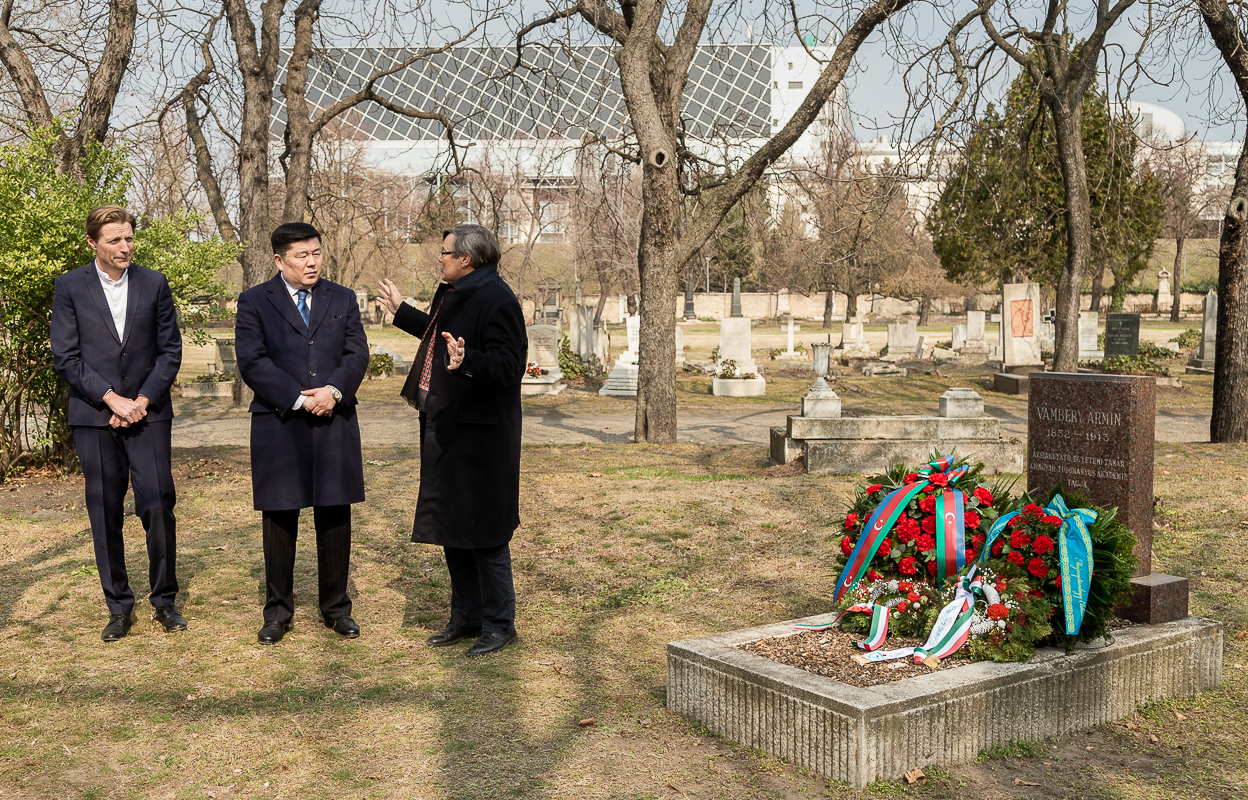The Representative Office of the Organization of Turkic States (OTS) held a commemoration of the 190th anniversary of the birth Ármin Vámbéry, the Orientalist and the researcher of the East at his tomb in the cemetery in Fiumei út, Budapest. The event was attended by H.E. Ambassador János Hóvári, the Head of the Representative Office of OTS, H.E. Zhanibek Abdrashov, the Ambassador of the Republic of Kazakhstan to Budapest, Sevda Faracova, the Counsellor of the Embassy of the Republic of Azerbaijan and Professor Pál Fodor, the Director General Emeritus of the Research Center of Humanities.
In his opening remarks, János Hóvári reminded the participants that the Representative Office of OTS holds regular commemorative events of Ármin Vámbéry (March 19, 1832–September 15, 1913), the Orientalist, the linguist, the full member of the Hungarian Academy of Sciences, the researcher of the East, and last but not at least, “the Great Traveler” who – as a Hungarian and a European – is highly respected in the Turkic world. The last time that the world of science expressed its tribute to the memory of the famous researcher of Asia when the 100th anniversary of his death was commemorated in 2013. Vámbéry disclosed that it was the hearsay by the peasants in Dunaszerdahely (today Dunajská Streda, Slovakia) about our Eastern heritage that he had heard as a teenager that focused his attention on the Turkic world. All his life, he was trying to discover the great secret: what have the Hungarians in common with some of the languages and peoples of the Turkic world? In memory of Vámbéry and in the organization of the Representative Office, the film “The Lame Dervish” – made in Tajik–Hungarian–Turkish co-production in 1987 – was screened in the Uránia National Film Theater in February.
Turkologist Dávid Somfai-Kara pointed out that the desire of Vámbéry – a trip to the East – became attainable by 1856, thanks in the first place to the support of Baron József Eötvös. “The Great Traveler”, who spoke about thirty languages, left for the East in 1857. First, he spent four years in Istanbul, and then, after a short stint in Hungary, he embarked on his trip. Alias Rashid effendi, he joined a caravan, and after an arduous journey across the desert, he reached Bukhara. In the town isolated from the world, thanks to his good fortune and luck, he gained access to manuscripts in the library of the ruling Emir that promised to shed new light on the early history of the Hungarians. However, after the death of the Emir, the good luck of Vámbéry, masking himself as a dervish, deserted him. He was even imprisoned before he managed to finally return home during a veritable odyssey.
Professor Pál Fodor added to the remarks of the above speakers that the writings of Vámbéry made a great contribution to people in Europe – who had known only the Ottoman world before – gaining new information on the changes in the social and political life in Turkey.
The commemoration ended with laying a wreath on the tomb of Ármin Vámbéry.
Photos: Kristof Z. Markovics



